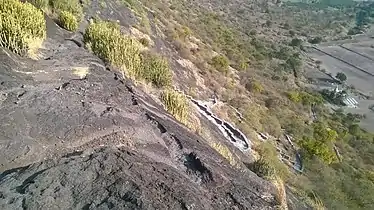Narayangad
Narayangad is a fort in Pune district near to khodad-Gadachiwadi in the Indian state of Maharashtra.[1]
| Narayangad | |
|---|---|
| Pune district, Maharashtra | |
 Narayangad  Narayangad | |
| Coordinates | 19°16′58″N 74°01′56.2″E |
| Type | Hill fort |
| Height | 2557 Ft. |
| Site information | |
| Owner | Government of India |
| Controlled by |
|
| Open to the public | Yes |
| Condition | Good |
| Site history | |
| Materials | Stone |
Location
About three miles east of the town Narayangoan on a detached hill which on the north, south, and west rises sharp from the plain is the dismantled fort of Narayangad. Narayangad is a hill fort near Pune, located 80 km from Pune, 8 km from Narayangaon and 5 km from Khodad village. Near Narayangad is a small village named Gadachiwadi. The name of the taluka- Junnar(Shivaneri fort) Narayagoan is derived from the fort. From the base of the fort to the top of the fort is an easy climbing of twenty minutes.
Also the bus available from Narayangaon to khodad from Narayagoan on 7km a bus stop Named as "GADACHWADI". From that point you can enjoy a trek with natural environment.
Places to see
Above the fort there are small waterponds named Narayantake, and Chambar Take. At the highest point of the fort there is a temple of the Goddess "Hastamata" and below it there is the temple of "Mukaai". The hill has some other ruins, especially a stone doorway bearing on its lintel a figure of Ganpati and two attendant tigers. The Giant Meterwave Radio Telescope GMRT project, that is located 10 km away has in the recent times popularised the fort amongst trekkers. Built in the North-South direction the fort has its main entrance on the western side.
History
The fort is from the Satvahana era and was used as a watch point for the Junnar Paithan route. The fortress is said to have been rebuilt by the first Peshwa Balaji Vishvanath (1714-1720) and given in saranjam or service-grant to Sayaji Povar. In the last Maratha war of 1818 Narayangad is said to have surrendered to the British in 1818 .
Gallery
 Radio telescope
Radio telescope The temple at the base of the fort
The temple at the base of the fort Steps to the fort
Steps to the fort Top of the fort
Top of the fort
References
- "Narayangad Fort surrounding Giant Telescopes". Tripoto. Retrieved 10 October 2019.